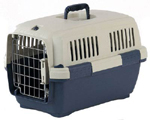|
Guidelines
for Weather Emergencies
 Evacuation
Planning Evacuation
Planning
The single most important thing you can do to protect your companion
animals is to take them with you if you evacuate. If it is not
safe for you, it is not safe for them. There is no way to predict
what will happen to your home while you are gone, and you may
not be able to return for weeks. Animals left inside your home
may become malnourished or dehydrated. In previous storms, animals
left in their homes have been crushed by collapsing walls and
have drowned in rising flood waters. Animals turned loose to fend
for themselves are likely to become victims of exposure, starvation,
contaminated food or water, or accidents. Leaving animals tied,
chained, or caged in a disaster is a death sentence! Identification

• Animals should be wearing collars with up-to-date identification
at all times. It is a good idea to include the phone number of
a friend or relative outside of the immediate area who will answer
the phone in case you become separated from your companions and
cannot be reached.
• Make sure to bring a recent photo of your companions for
identification purposes in case you need to prove that they are
yours.
Animal
Emergency Kit
Have an animal emergency kit prepared in advance and stored in
sturdy containers that can be easily carried if you must evacuate.
In your animal emergency kit, you should include:
• Sturdy leashes, harnesses, or carriers to transport you
companions safely and to ensure that they can’t escape.
Carriers should be large enough for your companions to stand up,
lie down, and turn around comfortably. Make sure to include bedding
and if possible special items such as a favorite toy to reduce
stress.
• Enough dry food and bottled water for at least five days,
food and water bowls, cat litter and a small litter tray.
• Medications and medical records stored in a waterproof
container and a first aid kit.
 Find
a Place to Go Ahead of Time Find
a Place to Go Ahead of Time
Most evacuation shelters do not accept companion animals. You
should plan ahead to ensure that you and your companions have
a safe place to go.
• Many hotels and motels lift their “no pets”
policies during emergencies, but keep a list of hotels that accept
companion animals just in case. (Most Motel 6’s and La Quinta
Inns accept animals.) Contact hotels and motels ahead of time
and ask about their policies. If they accept companion animals
or will waive their “no pets” policy during a disaster,
ask about restrictions on number, size and species. Call ahead
for a reservation as soon as you think you might need to leave
your home. Click
here for a list of pet-friendly hotels.
• Ask friends and relatives outside of your immediate area
if they would be able to shelter you and your animals, or just
your animals if necessary.
• Make a list of boarding facilities, veterinary offices,
and animal shelters outside of your immediate area that would
be willing to shelter animals in emergencies. Include 24-hour
telephone numbers. Please remember that shelters are often stretched
to their limits during disasters so only use them as a last resort.
If
You Must Leave Your Animal Behind
Although ARFF strongly urges you never to leave
your animal behind in a disaster, we recognize that some circumstances
may prevent responsible guardians from taking their animals. If
you are absolutely forced to leave your companions, please take
the following precautions to protect them.
• Never turn your companions loose, assuming they will be
safer and can get by on instinct. Domesticated animals rely on
humans for many things and will be rendered nearly helpless outside
in bad weather. It is best to leave them in a secure area inside
your home where they can freely roam. Many people have left their
animals caged or tethered inside their home, only to return and
find that the animals drowned because they couldn’t escape
the rising waters.
• Fill every bowl, pan or Tupperware container you have
with water and set them on the floor throughout the house. Do
not leave just one container, in case it is spilled. It is also
a good idea to fill sinks with water and leave the toilet seat
up if your toilet bowl is free of chemical disinfectants.
• Leave out at least ten days supply of dry food. Canned
food will go bad quickly.
• If you can’t get home, contact friends or family
in the area to see if they can check on the animals and get them
out. Supply them with specific care instructions.
• Place an emergency window sticker near your front door
in case an emergency strikes while you are not home. The sticker
will alert rescuers to animals in your home who may need help.
Be sure to note how many animals are in the home and if possible
where they can be found.
 If
You Don’t Evacuate If
You Don’t Evacuate
If you and your companion animals must wait out a disaster at
home, identify a secure area in your house where you can all
stay together.
• Bring all animals into the house.
• Keep dogs on leashes and cats in carriers, and make
sure they are wearing identification.
• Have any medications and a supply of dry food and bottled
water for at least ten days.
• Make sure your animal emergency kit is ready in case
you must leave quickly.
After
the Storm
Planning and preparation will help you weather the storm, but
your home may be a very different place afterward.
• Don’t allow your companion animals to roam loose
following an emergency. Familiar landmarks and smells might
be gone, and your companion could become easily disoriented
and lost.
• Keep your companions on a leash or inside carriers if
damage to your house could allow them to escape.
• Try to get them back into their normal routine as soon
as possible. Be patient with them if they exhibit behavioral
problems as it is likely a result of their stressful experience.
If behavioral problems persist or if your companions stop eating
or drinking, contact your veterinarian.
|
| "Pet"-Friendly
Hurricane Shelters.
Many counties in Florida have established animal-friendly
hurricane shelters. Make sure that you bring proof of rabies vaccination
and ample supplies for your animal(s), such as a crate, food and
medications. Pre-registration may be required to use one of the
shelters. Pets are not allowed at Red Cross shelters.
Miami-Dade
County. Miami-Dade County has two pet-friendly hurricane
shelters. One is at the Miami-Dade County Fair and Exposition
(Sunshine Pavilion, 10901 SW 24 Street) in Miami. The other shelter
is at Dr. Michael M. Krop Senior High (1410 NE 215 Street) in
North Miami. County residents who live in an evacation zone must
pre-register their companion animals (dogs, cats, gerbils, guinea
pigs, hamsters, mice/rats, rabbits, ferrets, and birds). For details,
visit www.miamidade.gov/animals/disaster_preparedness.asp.
Broward
County. Space is limited at Broward County's pet-friendly
shelter, located at Millennium Middle School (5803 N.W. 94th Avenue)
in Tamarac. Broward County residents in an evacuation zone who
would like to pre-register for the shelter can do so in person
at the Humane Society of Broward County. Call (954) 989-3977 for
more information about requirements and hours of registration.
Palm
Beach
County. Palm
Beach County's pet-friendly shelter is located at the West Boynton
Recreation Center, 6000 Northtree Blvd., in Lake Worth (between
Hypoluxo Road and Gateway Blvd. off the east side of Jog Road).
For more information, call Palm Beach Animal Care & Control
at (561) 233-1266. Click
here to pre-register online.
Monroe
County. Monroe County will have four pet-friendly shelters
in the event of a Category 1 or 2 hurricane (residents should
evacuate to the mainland during stronger hurricanes): Key West
High School, 2100 Flagler Ave.; Sugarloaf School, U.S. 1 and Crane
Boulevard, Mile Marker 19, bayside; Stanley Switlik Elementary
School, U.S. 1, Mile Marker 48, bayside; Coral Shores High School,
U.S. 1, Mile Marker 90, oceanside.
Orange,
Pasco, Pinellas, Hillsborough, Polk, Lake, Seminole, Martin, Brevard, Collier,
Sarasota, Volusia, Duval, Nassau, St. Johns and Bay Counties are
among those in Florida who also operate pet-friendly hurricane
shelters. Contact your county government, local humane society
or Red Cross for information on the availability of a hurricane
shelter near you that will accept you and your companion
animal(s).
|

 Make Plans Now to Protect Animals in Emergencies!
Make Plans Now to Protect Animals in Emergencies!
 Evacuation
Planning
Evacuation
Planning


 Find
a Place to Go Ahead of Time
Find
a Place to Go Ahead of Time If
You Don’t Evacuate
If
You Don’t Evacuate